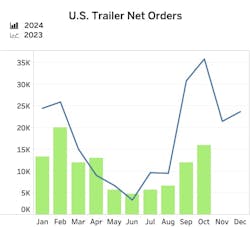November trailer orders improved month-over-month, according to the latest data from ACT Research and FTR Intel.
ACT tallied orders for 20,800 units in November in a 23% increase from October. However, order totals still were 4% below November 2023, the firm reported.
“November’s trailer orders bring year-to-date activity to 139,100 units, down 34% from ytd November 2023’s 211,000 bookings, competing against a better 2023 order environment, lingering pent-up demand, and modest supply chain congestion,” Jennifer McNealy, ACT director of CV market research and publications, said in a news release. “Order weakness exhibited in 2024 is made worse when viewed relative to 2023’s fuller backlogs.
“For the first time in nearly a year, order intake outpaced build, and by about 6,700 units. As a result, backlogs expanded almost 11% sequentially in November.
“While quotation and order activity have increased seasonally, the challenge is that data continue to tell the story of macro-facing industry segments being particularly hard hit, with OEMs struggling to keep current operations intact, against a much more competitive landscape compared to the past several years as the entire industry competes to book business. Simultaneously, strong Class 8 equipment purchases continue to oversupply the market, thereby dampening for-hire freight rates and limiting capex for new trailers.”
Trailers orders highest since December 2023, per FTR
U.S. trailer net orders rose 42% month-over-month and 6% year-over-year to 22,745 units in November—the highest net order total since December 2023 and welcome news given many months of weak orders, FTR reported. However, the overall 2025 order season thus far is shaping up to be well below expectations. A sluggish freight market remains a challenge for the U.S. trailer demand, and the opening of the 2025 order boards has seen continued weakness, tempering the potential outlook for next year.
Total trailer net orders thus far for the 2025 order season (September to November 2024) are down 42% y/y to 50,651 units, an average of only 16,884 units per month. Total trailer build declined 20% m/m in November to 13,238 units, down slightly more than the typical seasonal m/m drop, and was down 43% y/y. This output is 41% below the five-year average for November and marks the lowest monthly production level since 2010.
In November, total trailer net orders were well above total production, increasing backlogs by 10,124 units (+12% m/m) to 92,213 units. Lower m/m production and growing backlogs pushed the backlog/build ratio up to seven months, the highest reading since February 2024. This indicates some decreasing pressure on OEMs to scale back production in the near term.
The commercial vehicle market continues to see a disconnect between demand for trailers and demand for trucks. North American Class 8 net orders increased 2% y/y in September to November 2024 while U.S. trailer net orders dropped by 42% y/y during the same period. For-hire fleets have been prioritizing investments in new power units over trailers in 2024 ytd, likely influenced by reduced profitability or shifts in trade cycles. OEMs have notably cut back on production, but if 2025 trailer orders remain well below expectations, some OEMs may need to extend or deepen production cuts into next year.
“As we have discussed in the context of Class 8 truck orders, President-elect Trump’s plan to impose immediate tariffs on imports from Mexico, Canada, and China will add to the challenges,” said Dan Moyer, FTR senior analyst. “Those tariffs would significantly raise costs for fully assembled trailers imported from Mexico and Canada as well as for critical automotive parts sourced from these regions and China that are essential to U.S.-based trailer production. Resulting supply chain disruptions and/or cost increases could mean higher trailer prices, altered trade cycles and buyer demand patterns, and strains on fleet operator budgets.
“Slightly elevated trailer dealer inventories might temporarily meet a short-term demand surge as buyers attempt to avoid higher costs, but the potential for increased costs for Class 8 tractors might prompt some fleets to continue prioritizing purchasing power units over trailers in the near term.”










